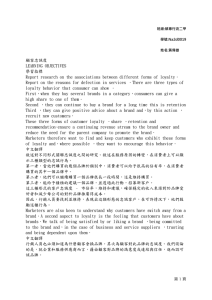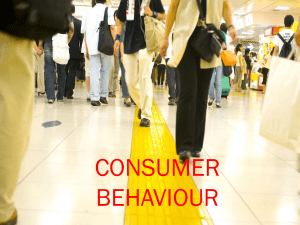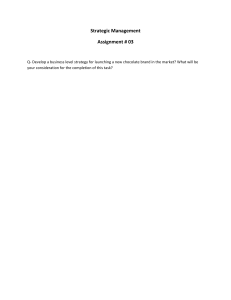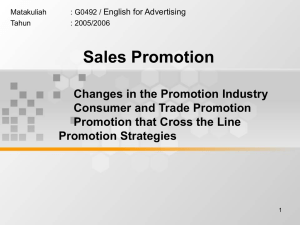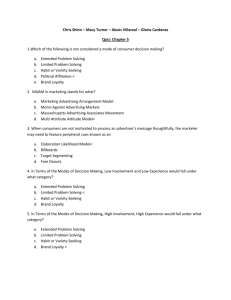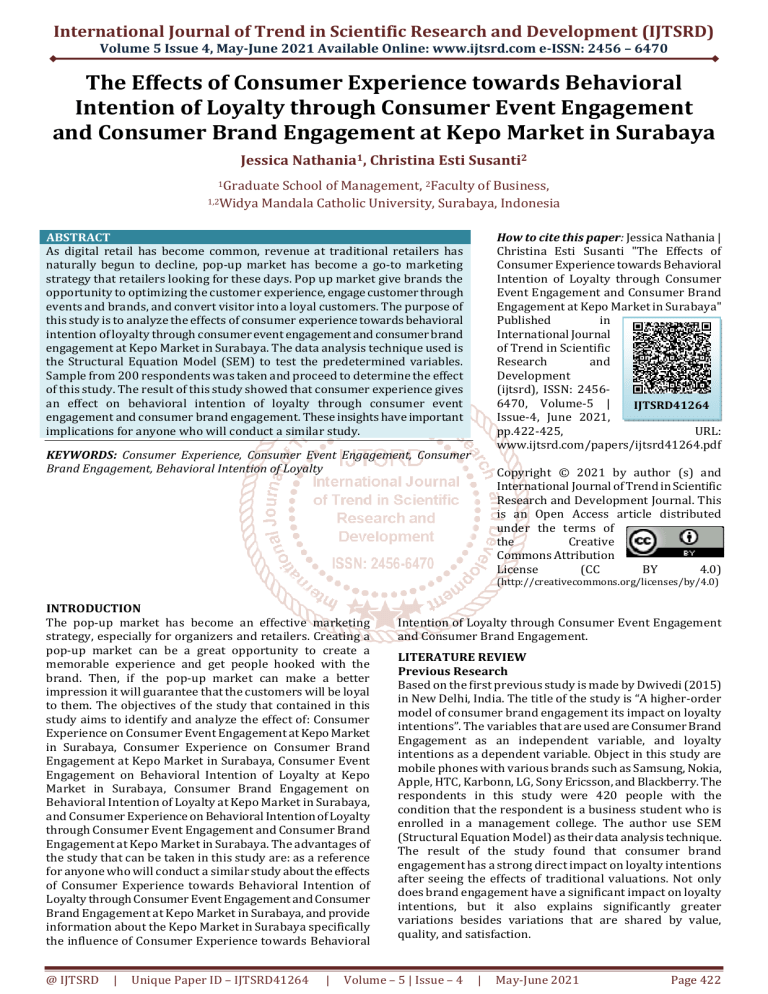
International Journal of Trend in Scientific Research and Development (IJTSRD)
Volume 5 Issue 4, May-June 2021 Available Online: www.ijtsrd.com e-ISSN: 2456 – 6470
The Effects of Consumer Experience towards Behavioral
Intention of Loyalty through Consumer Event Engagement
and Consumer Brand Engagement at Kepo Market in Surabaya
Jessica Nathania1, Christina Esti Susanti2
1Graduate
School of Management, 2Faculty of Business,
1,2Widya Mandala Catholic University, Surabaya, Indonesia
How to cite this paper: Jessica Nathania |
Christina Esti Susanti "The Effects of
Consumer Experience towards Behavioral
Intention of Loyalty through Consumer
Event Engagement and Consumer Brand
Engagement at Kepo Market in Surabaya"
Published
in
International Journal
of Trend in Scientific
Research
and
Development
(ijtsrd), ISSN: 24566470, Volume-5 |
IJTSRD41264
Issue-4, June 2021,
pp.422-425,
URL:
www.ijtsrd.com/papers/ijtsrd41264.pdf
ABSTRACT
As digital retail has become common, revenue at traditional retailers has
naturally begun to decline, pop-up market has become a go-to marketing
strategy that retailers looking for these days. Pop up market give brands the
opportunity to optimizing the customer experience, engage customer through
events and brands, and convert visitor into a loyal customers. The purpose of
this study is to analyze the effects of consumer experience towards behavioral
intention of loyalty through consumer event engagement and consumer brand
engagement at Kepo Market in Surabaya. The data analysis technique used is
the Structural Equation Model (SEM) to test the predetermined variables.
Sample from 200 respondents was taken and proceed to determine the effect
of this study. The result of this study showed that consumer experience gives
an effect on behavioral intention of loyalty through consumer event
engagement and consumer brand engagement. These insights have important
implications for anyone who will conduct a similar study.
KEYWORDS: Consumer Experience, Consumer Event Engagement, Consumer
Brand Engagement, Behavioral Intention of Loyalty
Copyright © 2021 by author (s) and
International Journal of Trend in Scientific
Research and Development Journal. This
is an Open Access article distributed
under the terms of
the
Creative
Commons Attribution
License
(CC
BY
4.0)
(http://creativecommons.org/licenses/by/4.0)
INTRODUCTION
The pop-up market has become an effective marketing
strategy, especially for organizers and retailers. Creating a
pop-up market can be a great opportunity to create a
memorable experience and get people hooked with the
brand. Then, if the pop-up market can make a better
impression it will guarantee that the customers will be loyal
to them. The objectives of the study that contained in this
study aims to identify and analyze the effect of: Consumer
Experience on Consumer Event Engagement at Kepo Market
in Surabaya, Consumer Experience on Consumer Brand
Engagement at Kepo Market in Surabaya, Consumer Event
Engagement on Behavioral Intention of Loyalty at Kepo
Market in Surabaya, Consumer Brand Engagement on
Behavioral Intention of Loyalty at Kepo Market in Surabaya,
and Consumer Experience on Behavioral Intention of Loyalty
through Consumer Event Engagement and Consumer Brand
Engagement at Kepo Market in Surabaya. The advantages of
the study that can be taken in this study are: as a reference
for anyone who will conduct a similar study about the effects
of Consumer Experience towards Behavioral Intention of
Loyalty through Consumer Event Engagement and Consumer
Brand Engagement at Kepo Market in Surabaya, and provide
information about the Kepo Market in Surabaya specifically
the influence of Consumer Experience towards Behavioral
@ IJTSRD
|
Unique Paper ID – IJTSRD41264
|
Intention of Loyalty through Consumer Event Engagement
and Consumer Brand Engagement.
LITERATURE REVIEW
Previous Research
Based on the first previous study is made by Dwivedi (2015)
in New Delhi, India. The title of the study is “A higher-order
model of consumer brand engagement its impact on loyalty
intentions”. The variables that are used are Consumer Brand
Engagement as an independent variable, and loyalty
intentions as a dependent variable. Object in this study are
mobile phones with various brands such as Samsung, Nokia,
Apple, HTC, Karbonn, LG, Sony Ericsson, and Blackberry. The
respondents in this study were 420 people with the
condition that the respondent is a business student who is
enrolled in a management college. The author use SEM
(Structural Equation Model) as their data analysis technique.
The result of the study found that consumer brand
engagement has a strong direct impact on loyalty intentions
after seeing the effects of traditional valuations. Not only
does brand engagement have a significant impact on loyalty
intentions, but it also explains significantly greater
variations besides variations that are shared by value,
quality, and satisfaction.
Volume – 5 | Issue – 4
|
May-June 2021
Page 422
International Journal of Trend in Scientific Research and Development (IJTSRD) @ www.ijtsrd.com eISSN: 2456-6470
The second previous study is made by Greve (2014) in
Germany with title “The moderating effect of customer
engagement on the brand image-brand loyalty relationship”.
Variables that are used are Customer Engagement, Brand
Image, and Brand Loyalty. Object in this study is the
Facebook fan-page of HSBA (Hamburg School of Business
Administration) University with 201 people as their
respondents. The author use Partial Least Square as their
data analysis technique. The study found out that passive
engagement activity has an influence on brand loyalty. The
author also found that brand image is negatively moderated
by engagement activity, which means a higher level of
engagement can reduce the brand image link on brand
loyalty.
The third previous study is made by Altschwager on 2014 in
Australia. The title of the study is “Branded marketing
events: the influence of event experience on customer
engagement”. The variables that used in this study such as
Experiential Needs, Customer Event Engagement, Customer
Brand Engagement, and Behavioral Intention of Loyalty.
Object in this study are South Australian’s wine industry. The
respondents in this study were 274 people with Structural
Equation Model (SEM) as their data analysis technique.
Result of the study showed that there was a mutually
supportive relationship in the variable customer event
engagement and customer brand engagement in the social
dimension. BME experience facilitates customer brand
engagement through customer engagement events. Then, the
need for cognition has a significant moderation effect
between BME experience and customer event engagement,
researchers also found that an individual's need for affection
or seeking needs moderate the relationship between BME
experiences and customer event engagement.
Theoretical Basis
Experience is a response in terms of interacting between
consumers and products, and with organizations or
companies for giving a reaction. Definition of experience
according to Schmitt (1999), are events that occur in
response to stimulation or stimulation. Irawan (2006) said
that customer experience is simply a process, strategy, and
implementation of a company to manage consumers against
their experience with a product or service. The purpose of
customer experience is to be able to build relationships with
consumers and create customer loyalty. Schmitt (1999)
refers to the role of customers as creatures of rational and
emotional character who want to experience a pleasant
experience. A pleasant experience can come from 5 aspects
such as sense, feel, think, act, and relate. According to
Verhoef et al. (2009) building, customer experience is
holistically natural and involves cognitive, affective,
emotional, physical, and social responses to customers to
retailers, and this definition is the latest and still has a lot to
do with retail. Consumer experience is a subjective thing that
is felt by customers when interacting directly or indirectly
with the company. "However, companies can choose what
kind of experiences they aim to produce" (Löytänä &
Kortesuo 2011: 11). Therefore, each experience in the same
way that is owned by consumers will differ from one
another. Positive experiences do not happen by chance or
come from the functions or features of the products, but
must be created and built so that consumers can have the
best experience.
Engagement according to Brodie et al., (2011a) in Hollebeek
(2011a) is “a psychological mindset that occurs through
@ IJTSRD
|
Unique Paper ID – IJTSRD41264
|
interactive experiences between engagement subjects and
objects”. Consumer event engagement is defined as the
intensity of individual participation in and its relationship
with organizational offerings and/or organizational
activities, carried out by customers or organizations (Vivek
et al., 2012: 127). Customers engage in several behaviors
that strengthen relationships with products, companies, or
brands that go beyond buying behavior (Gummerus et al.,
2012). According to Otker (1988), “event marketing consists
of purposeful activities through which a firm attempts to
build and strengthen its brands with self-organized events
for a limited target group while utilizing various forms of
marketing communication”. Initially, the marketing event
itself aims to meet the needs of the company but the
definition then develops and makes the marketing event a
marketing tool that provides opportunities for consumers
and companies to interact with each other. Marketing events
have special characteristics compared to other forms of
marketing communication, where marketing events use
several communication problems that help to overcome the
problem of over-communication. According to Kronvall &
Törnroos (1998) “events are selected by their potential to
reach target markets and accomplish objectives in the most
efficient way compared to alternative investments”.
Marketing events provide the power of integration for all
elements of the marketing mix that are designed around it so
that it is very effective as a marketing communication tool.
Kahn (1990) stated that “engagement means to be
psychologically present when occupying and performing an
organizational role”. Since then, the term has emerged as a
psychological state (such as involvement, commitment,
attachment, and moods), a construct of performance (such as
observable behavior), disposition, or a combination of these
(Macey & Schneider, 2008). Consumer brand engagement is
defined as the intensity of individual participation in and its
relationship
to
organizational
offerings
and/or
organizational activities, carried out by customers or
organizations. Hollebeek (2011) describes consumer brand
engagement as “an individual-level construct which is
supported by the early work on the nature of the construct”.
Hollebeek (2011) adds that “the subject of engagement is the
individual consumer and the object is a specific brand”.
Behavioral intentions have been defined by Eagly & Chaiken
(1993) as “a person’s conscious plan to exert effort to carry
out a particular behaviour with these intentions being
formed from both a personal evaluative and a normative
construct”. Zeithaml et al., (1996) added behavioral
intentions of customers were conceived as either favorable
or unfavorable. This means that positive behavioral
intentions can benefit the relationship between companies
and consumers. “High service quality and a positive
experience often lead to favorable behavioral intention
toward the service provider, and to the customer willingly
paying a higher price” (Hoch & Deighton, 1989). Sambandam
& Lord (1995) explain that “when the product quality does
not meet expectations, customers feel dissatisfied, and this
may influence their subsequent behavior.” According to
Zhang et al., (2011) dissatisfied customers tend to have
lower repurchase intentions and are more likely to engage in
complaints behavior than satisfied customers. According to
Srinivasan et al., (2002) loyal customers will consider
economic factors and relationships with the company during
shopping, while less loyal customers might mainly consider
economic factors. Rauyruen & Miller (2007) identified
Volume – 5 | Issue – 4
|
May-June 2021
Page 423
International Journal of Trend in Scientific Research and Development (IJTSRD) @ www.ijtsrd.com eISSN: 2456-6470
behavioral loyalty as the willingness of customers to
repurchase services or products and to maintain
relationships with service providers or suppliers.
Research Model
Dimitriades (2006) emphasizes that the buying behavior
seen is in actions that originate from the past, not in the
future.
Consumer Event
Engagement
H1
H3
Behavioral
Intention of Loyalty
Consumer
Experience
H2
H4
Consumer Brand
Engagement
Figure 1. Research Framework
This figure explained about the effects of Consumer
Experience towards Behavioral Intention of Loyalty through
Consumer Event Engagement and Consumer Brand
Engagement.
Hypothesis
Based on the theoretical basis and previous research, the
hypothesis can be defined as follows:
1. Consumer Experience has significant effect towards
Consumer Event Engagement at Kepo Market in
Surabaya.
2. Consumer Experience has significant effect towards
Consumer Brand Engagement at Kepo Market in
Surabaya.
3. Consumer Event Engagement has significant effect
towards Behavioral Intention of Loyalty at Kepo Market
in Surabaya.
4. Consumer Brand Engagement has significant effect
towards Behavioral Intention of Loyalty at Kepo Market
in Surabaya.
5. Consumer Experience has significant effect towards
Behavioral Intention of Loyalty through Consumer Event
Engagement and Consumer Brand Engagement at Kepo
Market in Surabaya.
RESEARCH METHODOLOGY
The type of research used is a clausal study to identify the
extent and nature of the cause-and-effect relationship
between variables. This study was conducted in Surabaya by
taking Kepo Market as an object. The data from 200
respondents were used in this study and have characteristics
as follows at least 17 years old, domiciled in Surabaya, and
have visited Kepo Market at least 1 time in the last 2 months.
The sampling technique in this study used non-probability
sampling by purposive sampling that are selected based on
the subjective assessment of the respondents. Data collection
tools used in this study was questionnaire by using a Likert
scale (1-5) as a measurement of the variables. The data
analysis technique used in this study is the Structural
Equation Model (SEM).
RESULTS AND DISCUSSION
Result
Based on the result, the hypothesis test can be explained as
follows: Consumer Experience has a positive and significant
effect on Consumer Event Engagement. This influence can be
proved with loading factor 1.12 and t-value 3.39 (t-value ≥
1.96). Consumer Experience positively and significantly
@ IJTSRD
|
Unique Paper ID – IJTSRD41264
|
impacts Consumer Brand Engagement with loading factor
0.81 and t-value 3.85. Consumer Event Engagement has a
positive and significant effect on Behavioral Intention of
Loyalty with loading factor 0.23 and t-value 2.99. Consumer
Brand Engagement positively and significantly impacts
Behavioral Intention of Loyalty. This influence can be proved
with the loading factor 1.02 and t-value 4.00 (t-value ≥ 1.96).
Consumer Experience has a positive and significant effect
towards Behavioral Intention of Loyalty through Consumer
Event Engagement and Consumer Brand Engagement with
loading factor 1.08 and t-value 4.31 (t-value ≥ 1.96).
Discussion
The effect of Consumer Experience on Consumer Event
Engagement
Based on the result of the structural equation, it can be
stated that the effect of Consumer Experience on Consumer
Event Engagement is positive. Hypothesis testing proves the
effect of Consumer Experience towards Consumer Event
Engagement with loading factor of 1.12 and t-value 3.39 (tvalue ≥ 1.96). This proved that the influence of Consumer
Experience on Consumer Event Engagement is significant.
The effect of Consumer Experience on Consumer Brand
Engagement
Based on the hypothesis testing, the influence of Consumer
Experience on Consumer Brand Engagement is positive. It
can be shown by loading factor 0.81 and t-value 3.85 (t-value
≥ 1.96) which means that the influence of Consumer
Experience on Consumer Brand Engagement is significant.
The effect of Consumer Event Engagement on Behavioral
Intention of Loyalty
Based on the result of the structural equation, it can be
stated that the effect of Consumer Event Engagement on
Behavioral Intention of Loyalty is positive. Hypothesis
testing proves the effect of Consumer Event Engagement
towards Behavioral Intention of Loyalty with loading factor
of 0.23 and t-value 2.29 (t-value ≥ 1.96). This proved that the
influence of Consumer Event Engagement on Behavioral
Intention of Loyalty is significant.
The effect of Consumer Brand Engagement on
Behavioral Intention of Loyalty
Based on the hypothesis testing, the influence of Consumer
Brand Engagement on Behavioral Intention of Loyalty is
positive. It can be shown by loading factor 1.02 and t-value
4.00 (t-value ≥ 1.96) which means that the influence of
Volume – 5 | Issue – 4
|
May-June 2021
Page 424
International Journal of Trend in Scientific Research and Development (IJTSRD) @ www.ijtsrd.com eISSN: 2456-6470
Consumer Experience on Consumer Brand Engagement is
significant.
The effect of Consumer Experience on Behavioral
Intention of Loyalty through Consumer Event
Engagement and Consumer Brand Engagement
Based on the result of the structural equation, it can be
stated that the effect of Consumer Experience on Behavioral
Intention of Loyalty through Consumer Event Engagement
and Consumer Brand Engagement is positive. Hypothesis
testing proves the effect of Consumer Experience on
Behavioral Intention of Loyalty through Consumer Event
Engagement and Consumer Brand Engagement with loading
factor of 1.08 and t-value 4.31 (t-value ≥ 1.96). This proved
that the influence of Consumer Experience on Behavioral
Intention of Loyalty through Consumer Event Engagement
and Consumer Brand Engagement is significant.
CONCLUSION AND SUGGESTION
This study examined the effects of consumer experience
towards behavioral intention of loyalty through consumer
event engagement and consumer brand engagement at Kepo
Market in Surabaya. Based on the result of hypothesis testing
and discussion on the study, it can be concluded that all
hypothesis are accepted and the influence among variables
are also significant. This study can be used as a reference to
anyone who wants to conduct a similar study, by adding
some of the additional variables that can be used in future
studies. Suggestions that can be given in this study is that
Kepo Market can enhance brand collaboration that can make
some visitors more eager to be involved in the event, and
Kepo Market can build up new relationship with their new
vendors who will work with them in the future.
ACKNOWLEDGEMENT
I would like to express my sincere gratitude to Graduate
School of Management, Widya Mandala Catholic University
Surabaya for letting me be a part of the student here. I would
also like to thank Dr. Christina Esti Susanti, MM., CPM (AP)
for your guidance and suggestions throughout completing
the thesis.
REFERENCES
[1] Brodie, R., Hollebeek, L. D., Juric, B., & Ilic, A. (2011).
Customer engagement: Conceptual domain,
fundamental propositions, and implications for
research. Journal of Service Research 17(3), 1-20.
[2]
Dimitriades, Z. S. (2006). Customer satisfaction,
loyalty and commitment in service organizations.
Management Research News, Vol. 29 No. 12, 782-800.
[3]
Eagly, A., & Chaiken, S. (1993). The psychology of
attitudes. Orlando, FL: US: Harcourt Brace Jovanovich
College Publishers.
[4]
Gummerus, J., Liljander, V., Weman, E., & Pura, M.
(2012). Customer engagement in a Facebook brand
community. Management Research Review 35(9), 857877.
[5]
Hoch, S., & Deighton, J. (1989). Hoch, S. J., & Deighton,
J. (1989). Managing what consumers learn from
experience. Journal of Marketing, 53(2), 1-20.
@ IJTSRD
|
Unique Paper ID – IJTSRD41264
|
[6]
Hollebeek, L. D. (2011). Demystifying Customer Brand
Engagement: Exploring the Loyalty Nexus. Journal of
Marketing Management 27(7-8), 787.
[7]
Irawan, H. (2006). Customer Experience Strategy
Marketing, No.01 / TH.V.
[8]
Kahn, W. A. (1990). Psychological Conditions of
Personal Engagement and Disengagement at Work.
The Academy of Management Journal, Vol. 33, No. 4,
692-724.
[9]
Kronvall, M., & Törnroos, J. (1998). Understanding
event marketing management: a case study of Nokia
Balalaika show in Berlin. Helsinki, Finland: Swedish
School of Economics and Business Administration.
[10]
Löytänä, J., & Kortesuo, K. (2011). Customer
Experience: Service Business experience in the
business. Finland, Hämeenlinna: Karisto printing
house.
[11]
Macey, W. H., & Schneider, B. (2008). The Meaning of
Employee Engagement. Industrial and Organizational
Psychology 1(1), 3-30.
[12]
Otker, T. (1988). Exploitation: The key to sponsorship
success. European Research, 77-86.
[13]
Rauyruen, P., & Miller, K. E. (2007). Relationship
Quality as a Predictor of B2B Customer Loyalty.
Journal of Business Research Vol. 60, 21-31.
[14]
Sambandam, R., & Lord, K. R. (1995). Switching
Behavior in Automobile Markets: A ConsiderationSets Model. Journal of the Academy of Marketing
Science Volume 23, No.1, 57-65.
[15]
Schmitt, B. (1999). Experiential Marketing. Journal of
Marketing Management, 15(3), 53-67.
[16]
Srinivasan, K., Anderson, R., & Ponnavolu, K. (2002).
Customer Loyalty in E-Commerce: An Exploration of
Its Antecedents and Consequences. Journal of
Retailing 78(1), 41-50.
[17]
Verhoef, P. C., Lemon, K. N., Parasuraman, A. P., &
Roggeveen, A. L. (2009). Customer Experience
Creation: Determinants, Dynamics and Management
Strategies. Journal of Retailing 85(1), 31-41.
[18]
Vivek, S., Beatty, S., & Morgan, R. (2012). Customer
Engagement: Exploring Customer Relationships
beyond Purchase. J.Mark. Theory Pract. 20(2), 127145.
[19]
Zhang, J., Lam, E., Cianfrone, B., Zapalac, R., Holland, S.,
& Williamson, D. (2011). An importance performance
analysis of media activities associated with WNBA
game consumption. Sport Management Review Vol. 14,
64-78.
[20]
Zeithaml, V. A., Berry, L. L., & Parasuraman, A. (1996).
The Behavioral Consequences of Service Quality.
Journal of Marketing 60(2) .
Volume – 5 | Issue – 4
|
May-June 2021
Page 425

